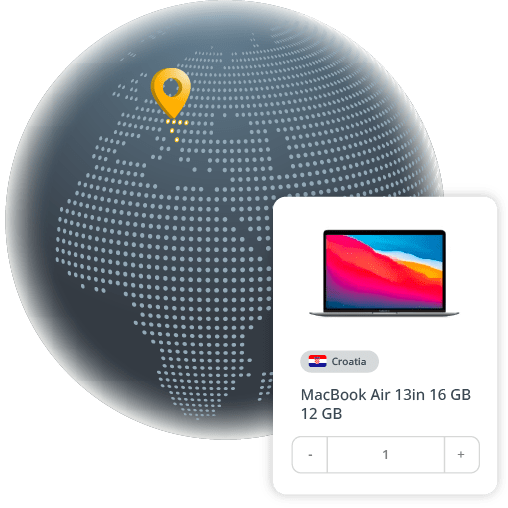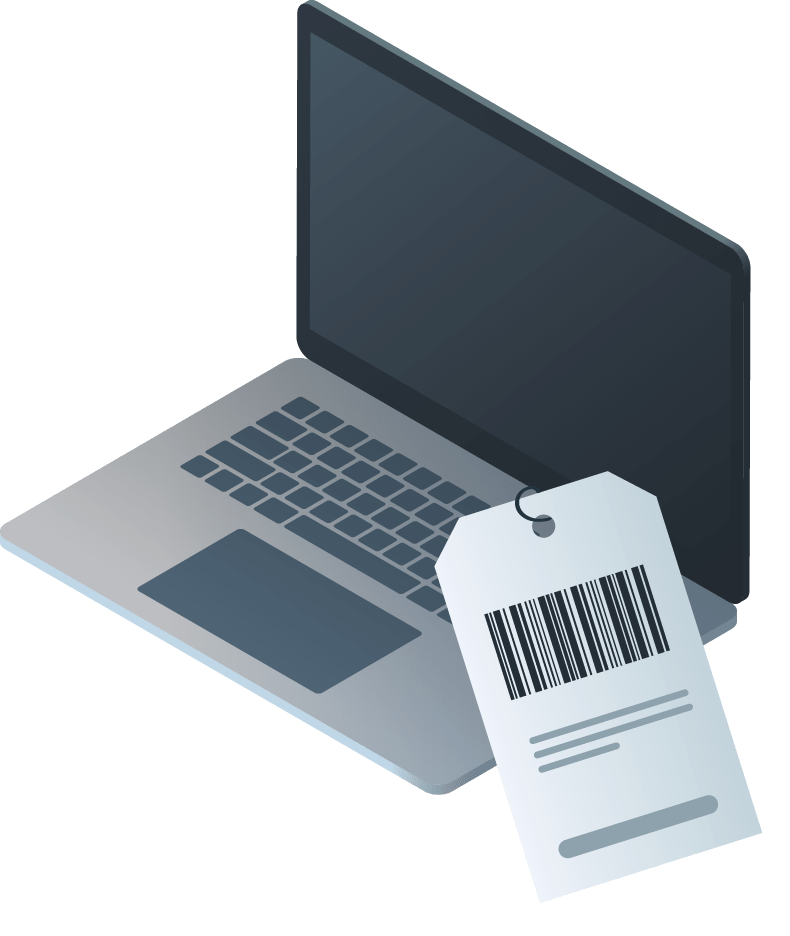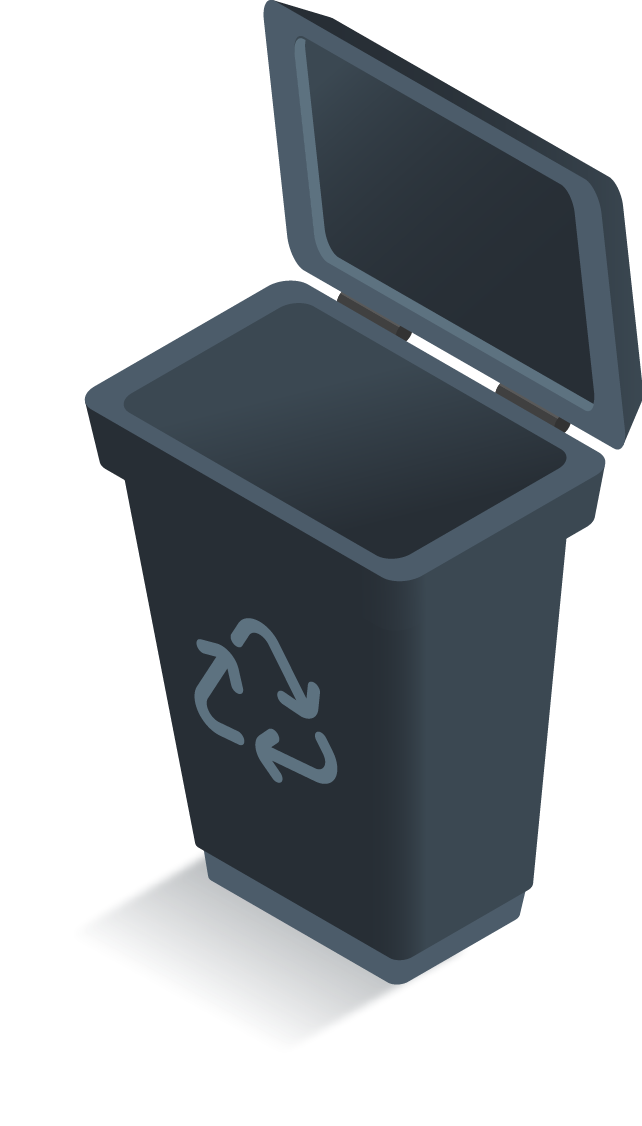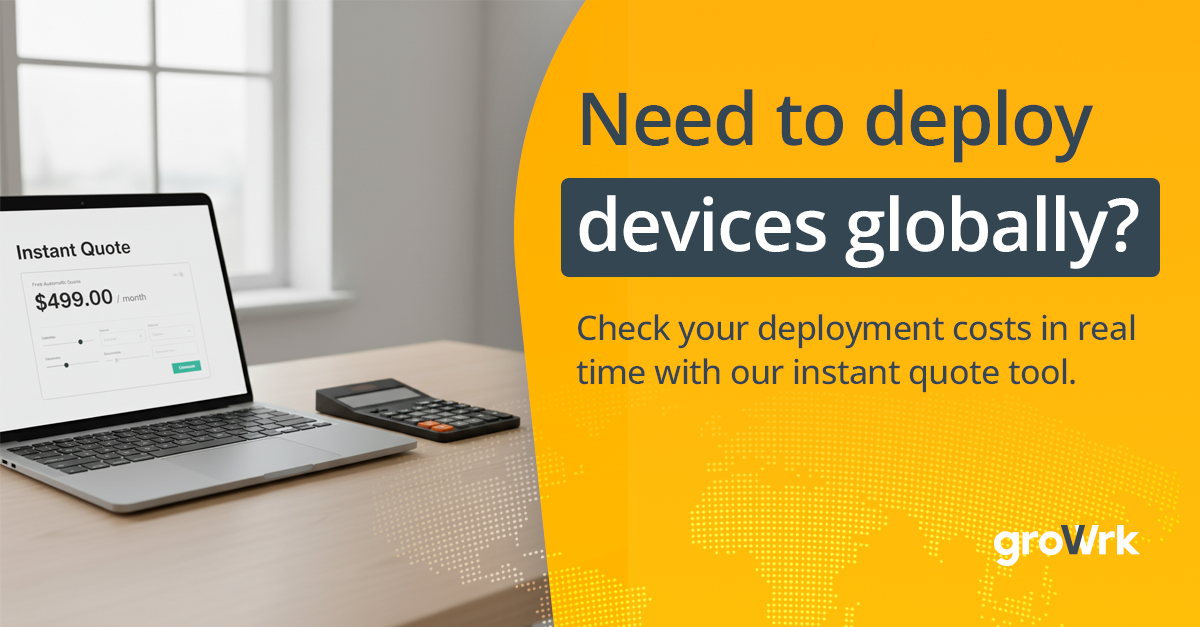How to send IT equipment to Croatia
Ready to ship IT equipment to your remote teams in Croatia? GroWrk makes IT asset management across borders seamless. Whether it's laptops, servers, or other critical tech, we ensure smooth and secure delivery to Croatia.

At a glance
Croatia, a key hub in Southeast Europe, has been making waves with its growing economy, cutting-edge IT infrastructure, and flourishing tech sector. As an emerging hotspot for IT outsourcing, Croatia attracts global businesses seeking to enhance efficiency and reduce costs, all while maintaining high standards of quality.
|
CURRENCY Croatian Kuna (HRK) |
OFFICIAL LANGUAGE Croatian |
TIME ZONE Central European Time (CET), GMT+01:00 Central European Summer Time (CEST) during daylight saving time |
|
CUSTOMS DUTY ON ELECTRONICS 25% VAT Typically 25% VAT on imported goods |
SHIPPING LEAD TIME 4-8 days (depending on location and shipping method) |
IT OUTSOURCING MARKET The IT outsourcing market is expected to grow to US$ 591.24 billion by 2025. |
Overview of IT operations in Croatia

Driving digital innovation: Croatia is rapidly emerging as a hub for digital innovation, with the number of users projected to hit 3.66 million by 2029, marking a new high. The country’s focus on fintech, e-commerce, and digital startups creates a vibrant landscape for businesses looking to expand.
State-of-the-art IT infrastructure: Croatia is establishing a robust foundation for tech operations through its expanding internet connectivity and growing network of data centers. The country is emerging as a significant player in cloud computing, hosting services, and digital solutions for businesses looking to expand or optimize their digital footprint.
Sustainability focus: Croatia is committed to reducing its carbon footprint, with government initiatives and incentives encouraging businesses to adopt green technologies. The country is fostering a future where technology and sustainability coexist, creating an ideal environment for forward-thinking companies.
Highly skilled workforce: With a strong emphasis on tech education, Croatia has built a talent pool of skilled IT professionals, particularly in software development, coding, cybersecurity, and system management. This growing workforce makes the country an attractive destination for companies seeking tech-savvy employees to drive innovation.
Business-friendly environment: Croatia’s regulatory framework is business-friendly, with clear tax policies and strong data protection laws that provide a stable environment for global tech firms. This openness to foreign investment and collaboration creates fertile ground for international companies to thrive.
Solid cybersecurity measures: Croatia is working hard to strengthen its cybersecurity defenses, with robust legal frameworks and active steps to protect critical infrastructure, digital systems, and user data from emerging cyber threats.
A thriving tech hub: Cities like Zagreb and Split are growing hubs for innovation, fueled by a thriving startup ecosystem, government support, and access to venture capital. Croatia’s tech scene is becoming increasingly vibrant, offering exciting opportunities for businesses to collaborate, innovate, and grow.
Shipping IT equipment to Croatia: What you need to know
| Customs regulations |
|
| Duties and taxes |
|
| Required documentation |
|
| Import restrictions |
|
| New vs. Used equipment |
|
| Customs clearance process |
|
| Penalties or fines for non-compliance |
|
Checklist for sending laptops to Croatia
When shipping laptops to Croatia, it’s important to follow a few best practices to ensure the process goes smoothly, and your equipment arrives safely and on time. Here are some helpful shipping tips:

Select trusted couriers: Choose reliable couriers such as GroWrk, DHL, UPS, FedEx, or Hrvatska pošta (Croatian Post) for international shipping. These carriers provide tracking services and are experienced with Croatian customs procedures.
Check service levels: Select the appropriate shipping option based on urgency. Express shipping (3-7 days) for high-priority deliveries. Standard shipping (7-14 days) for cost-effective options.
Use high-quality packaging: Secure laptops with sturdy, padded boxes and protective materials like bubble wrap, foam inserts, or air cushions to prevent damage during transit.
Disassemble where possible: If shipping accessories like chargers, docking stations, or monitors, package them separately to prevent damage. Remove detachable components if applicable.
Label clearly: Ensure the recipient’s name, address, and contact details are correctly labeled. Mark the package as "fragile" to encourage careful handling.
Accurate product descriptions: On the commercial invoice, provide a detailed and accurate description of the laptop, including its brand, model, and serial number. Inaccurate descriptions may cause customs delays.
Value declaration: Declare the correct value of the laptop to avoid under- or over-declaring, which could lead to customs inspections or fines. The declared value determines any applicable duties and taxes.
Customs declarations: Croatia is part of the EU, so shipments within the EU do not require customs clearance. For shipments from outside the EU, include: EU Single Administrative Document (SAD), commercial invoice, and packing list.
Proof of origin: If applicable, Attach a certificate of origin if applicable to benefit from EU trade agreements, which can reduce or eliminate import duties.
Understand import duties & taxes: Laptops are duty-free under EU customs rules but are subject to 25% VAT on the CIF value (Cost + Insurance + Freight).
Pre-pay duties and taxes: Some couriers allow for pre-paid duties and taxes to simplify customs clearance and prevent the recipient from facing unexpected charges upon arrival.
Protect against loss or damage: Consider purchasing shipping insurance for high-value laptops to protect against loss, theft, or damage during transit.
Compliance with Croatian regulations: Ensure compliance with EU regulations, including CE marking, RoHS, and WEEE directives for electronic products.
Use tracking tools: Major couriers provide real-time tracking—monitor shipments closely to anticipate customs clearance updates and delivery progress.
Stay in touch with the recipient: Notify the recipient about the expected delivery timeline, tracking updates, and any customs-related requirements to avoid delays.
Expect weather and seasonal delays: Account for potential delays during winter storms, Croatian public holidays, or high-volume periods like Black Friday and Christmas.
Croatian domestic delivery options: For final delivery, use local services like Hrvatska pošta, DPD Croatia, GLS Croatia, or Overseas Express for efficient distribution across the country.

Average cost of IT Equipment in Croatia
Laptops (Business Grade):
- Mid-range: HRK 14,000 - HRK 30,000
- High-end: HRK 30,000 - HRK 60,000
High-end models such as Apple MacBook Pro, Dell XPS, and Lenovo ThinkPad are priced on the higher end.
Monitors (Business Grade):
- Standard: HRK 5,200 - HRK 11,000
- Ultrawide/4K: HRK 13,000 - HRK 25,000
Monitors from trusted brands like Dell, Samsung, and LG typically range within these prices, with 4K or ultrawide models costing more.
Desktops (Business Grade):
- Standard Desktop PC: HRK 14,000 - HRK 50,000
- Workstation Desktop (for high-performance tasks): HRK 50,000 - HRK 135,000+
Prices depend on the brand and specifications, with options from HP, Lenovo, and Apple among the most common.
Printers (Laser):
- Standard Office Printers: HRK 4,500 - HRK 14,000
- High-Volume Printers: HRK 21,000 - HRK 63,000
Leading brands such as HP, Canon, and Brother offer a wide range of models for office environments.
Public holidays & IT work hours to plan your shipment
-
Key public holidays in Croatia:
- New Year’s Day – January 1
- Epiphany – January 6
- Easter Sunday – Date varies (typically April)
- Easter Monday – The day after Easter Sunday
- Labour Day – May 1
- National Day –19 June
- Independence Day – June 25
- Assumption of the Virgin Mary – August 15
- All Saints' Day – November 1
- Christmas Day – December 25
- Boxing Day – December 26
Typical work hours for IT professionals
- Standard Workweek
- In Croatia, a typical workweek for IT professionals spans 40 hours. Standard office hours usually run from 8:00 AM to 4:00 PM or 9:00 AM to 5:00 PM, Monday to Friday.
- However, many companies, especially in the IT sector, offer flexibility, allowing employees to adjust their working hours or work remotely, as long as they complete the required 40 hours.
- Overtime
- Overtime in Croatia is regulated by law and usually kept to a minimum. When employees need to work extra hours, they are entitled to additional pay or compensatory time off. The total working hours, including overtime, shouldn’t exceed an average of 48 hours per week in any given period.
- The standard overtime pay is typically 1.5 times the regular hourly rate, but for work on weekends or public holidays, this can increase depending on the company’s policy and the sector.
- Public Holiday Work
- Croatia has several public holidays throughout the year, such as New Year’s Day, Statehood Day, and Christmas Day. On these holidays, many IT professionals have time off, as offices are often closed or operate with reduced hours.
- If employees are required to work on public holidays, they are usually compensated with a premium pay rate or additional time off to be used at a later date. This ensures that working on holidays is appropriately recognized and rewarded.
What to consider when retrieving IT equipment from employees in Croatia
| Local delivery and logistics services |
|
| Inventory management |
|
| Logistics challenges for remote locations |
|
| Equipment agreement with employees |
|
How to dispose of IT equipment in Croatia
Data wiping
- Data wiping: Before disposing of any IT equipment, it’s critical to wipe all data securely. Certified software should be used to erase all data from hard drives, SSDs, or any other storage devices. This guarantees that sensitive information is permanently removed and cannot be retrieved.
- Shredding and destruction: For an extra layer of security, consider physically destroying storage devices. Methods like shredding or crushing ensure that no one can access the data stored on the equipment, even if it ends up in the wrong hands.
WEEE compliance (Waste Electrical and Electronic Equipment Directive)
- Certified E-Waste disposal: In Croatia, it’s essential to work with certified e-waste disposal services that align with Croatian regulations and European Union directives, such as the WEEE Directive. These certified services ensure that your equipment is dismantled safely and that hazardous materials, such as batteries, mercury, and other toxic substances, are disposed of responsibly.
- Recycling centers: Small electronics can typically be dropped off at local recycling centers. However, specialized disposal services are necessary for larger IT equipment, such as servers or office-wide machines. These services ensure that your more significant assets are adequately accounted for and handled by legal requirements.
Repurposing IT equipment
- Donation to charitable organizations: If your equipment is still functional, consider donating it to schools, non-profit organizations, or community groups in Croatia. Many institutions need functional IT devices, and your donation can help reduce waste while giving back to the community.
- Internal repurposing: For companies that regularly upgrade their IT infrastructure, repurposing older devices within the organization can be a great option. Devices that are no longer needed for critical tasks can be reassigned for less demanding purposes in other departments or utilized for employee training and development.
Manufacturer take-back programs
Many IT equipment manufacturers in Croatia offer take-back programs, which allow businesses to return old devices for recycling or repurposing. These programs help ensure responsible disposal and are designed to assist companies in complying with both local and international environmental standards.
Certified e-waste recycling providers
When selecting a disposal service, ensure that you partner with third-party providers certified by the relevant Croatian environmental authorities. Certified companies will handle the recycling process properly, ensuring that your equipment is disposed of legally and sustainably. Additionally, they will provide the necessary legal documentation and certificates of destruction or recycling, giving you peace of mind that the process has been done correctly.

Local IT Outsourcing Solutions in Croatia
You can streamline your IT logistics and asset management with GroWrk’s comprehensive global solution. Whether it’s shipping equipment or managing IT assets across multiple regions, GroWrk helps you stay compliant and efficient, every step of the way. Here’s why GroWrk is the ideal partner for managing your IT assets in Croatia:

| 1. Wide global coverage |
GroWrk offers a seamless IT outsourcing experience in over 150 countries, including Croatia. With a deep understanding of the local market, we make sure that your teams in Croatia receive tailored solutions that comply with Croatian regulations and industry best practices. |
| 2. End-to-end asset management |
GroWrk oversees the complete IT asset lifecycle, from procurement to disposal. We handle all aspects of your equipment, allowing your teams to focus on growing your business while we manage logistics and IT infrastructure in Croatia. |
| 3. Intuitive platform for easy deployment |
GroWrk’s platform simplifies IT asset deployment, usage tracking, and shipment monitoring in Croatia. By consolidating asset management into one system, we eliminate logistical headaches and boost operational efficiency for your teams. |
| 4. Smooth delivery and equipment retrieval |
GroWrk ensures the smooth delivery of IT equipment, such as laptops, to employees across Croatia. We also facilitate the swift return of equipment when employees leave, making the process stress-free and cost-effective for your business. |
| 5. Compliance with Croatian import regulations |
GroWrk ensures that all shipments comply with Croatia’s import regulations, customs procedures, and tax rules. From managing VAT to handling import duties, we make sure your IT equipment reaches its destination without any compliance-related delays. |
| 6. Efficient repairs and maintenance |
We offer efficient repair and maintenance services to keep your IT devices in top shape. GroWrk minimizes downtime by handling repairs promptly, helping your teams in Croatia remain productive and efficient. |
| 7. 24/7 Support for peace of mind |
Our expert customer support team is available around the clock to assist with any questions or concerns related to asset management, logistics, or shipping. Whether during business hours or after, GroWrk is here to support your IT operations in Croatia at any time. |
Procure, configure, and deploy your IT devices from one platform


